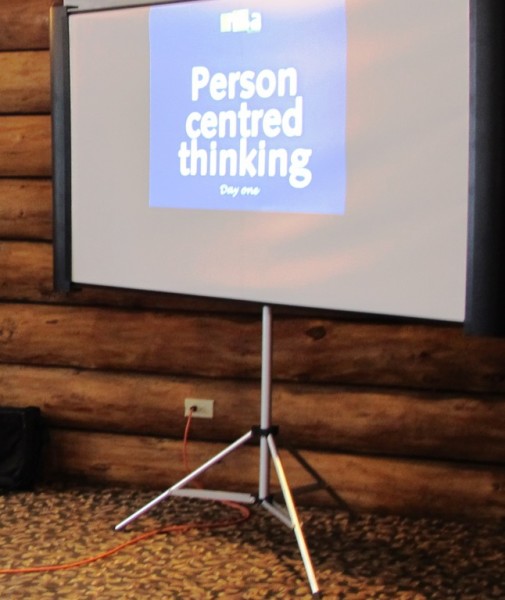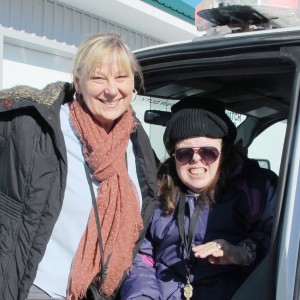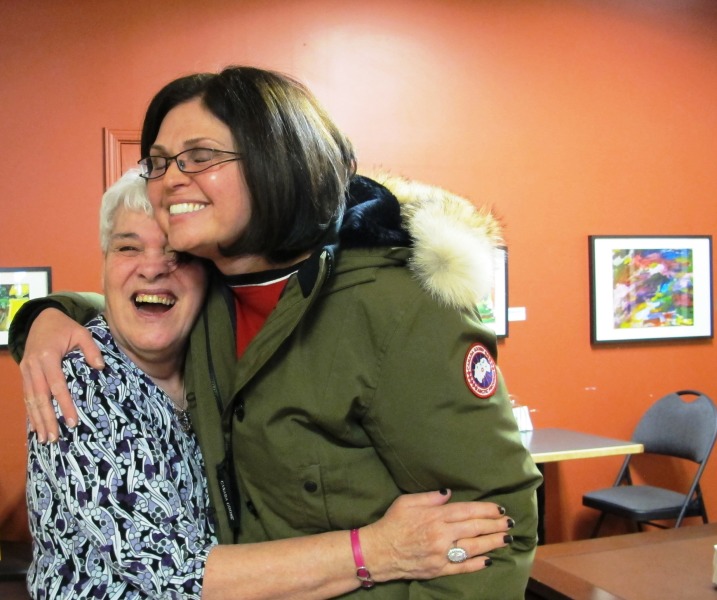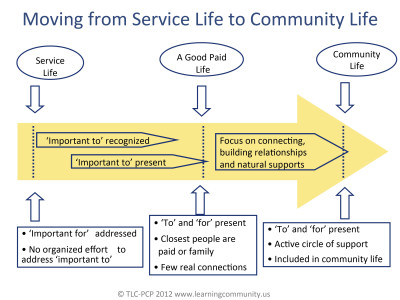Living in Community
May 1, 2015
Posted in: Uncategorized
Have you ever thought about what your life would be like if you had been born with a developmental disability? Not likely, why would you? Families and people who support those with developmental disabilities think about the people they love and support every day; but I never did because I never had to. Not really.
When I graduated with my teaching degree five years ago I had a good working knowledge of special education and the variety of ‘special’ youth I may be asked to educate. That helped me understand the medical causes of different behaviours but it did not make me think about what my life would have been like if I, or one of my kids, had been born with a disability.
My brother started showing signs of schizophrenia at the age of 18. He was not on medication, his behaviour was frightening and it was far beyond the ability of my family to know how to cope with him. Fortunately, in time a social worker helped him find medical help, housing and some safety. His life today at 56 is a happy one. He lives in his own one bedroom apartment with his companion dog Buddy, works, and enjoys a family that love and talk to him all the time. He has a few friends other than those who are paid to support him. My brother, paranoia and all, is one of the finest men you could ever want to know; a man of great character. His ‘behaviours’ limit the amount of friends in his life and the amount of time people want to spend with him. I find this sad to think about but, compared to the people with schizophrenia that I once saw locked in small white rooms on Queen Street West – Sam has a real life.
Some people with diagnosed developmental disabilities from Autism Spectrum to Downs Syndrome to Cerebral Palsy and a range of others, have started coming out of institutions where they lived as at best, patients and at worst, animals. Living in such conditions, even when cared for by well-meaning staff, was living a life of service. A service life is one where other people make all the decisions about your day and your life for you. You do what they say, when they say and how they say. No mind, no choice was the assumption. But what if there was a mind, a good mind, just a mind that works differently than the majority of the population. How did living a service life impact them?
 Under the best circumstances it may have kept them physically safe from harm but the emotional harm and the intellectual limits imposed on them were destructive, even if not intended.
Under the best circumstances it may have kept them physically safe from harm but the emotional harm and the intellectual limits imposed on them were destructive, even if not intended.
I have worked for Community Living Parry Sound, an agency that delivers support services to people who have a developmental disability for almost two years. Every staff member, including administrative staff like me, must attend training called Person Centered Thinking. There is so much jargon in every field and developmental services is certainly no exception, but when you dig into what this means, it is pretty amazing for anyone to think about.
The idea is simple; when you encounter someone with a developmental disability, see them first as a person who has admirable, likable qualities, wants and needs like everyone else. See the person first; then acknowledge the behaviour that the developmental disability has created.
Community Living organizations began as a grass-roots movement by parents and family of people with developmental disabilities who believed that their loved ones deserved more of a life than being cared for like ‘patients’. The movement galvanized those who could see past the disability and recognized the value of the person they loved. People started to make a difference and changes included the integration of people with developmental disabilities into schools and the development of supports to keep people at home with their families where they were treated as people first and the behaviour caused by the disability was able to be better understood. Life began to improve for people because they and their family were supported by many professionals; social workers, developmental services workers and behaviour therapists. Agencies provided physical spaces for people to spend time away from parents and siblings. This kind of life is referred to as ‘a good paid life’. Paid meaning that the people, other than family, they interact with are in some capacity paid to be with them.
A good ‘paid life’ is not the end game. Community living is the end game. A life fully integrated into the community as full and equal citizens making choices and doing the things that others do on a daily basis.
To get there we, meaning the community, need to learn to see the person before the disability when we interact with people in our community who live with a developmental disability.
Training ourselves to do this is important and all it takes is a willingness to be exposed to people who are different than us in some ways, long enough to recognize that they are exactly the same as us in other ways.
At the person centred thinking training we were all asked to answer these three questions about ourselves. What do people like and admire about you? What is important to you? How can the people you live and work with best support you? These questions make you think about yourself, and others think about you, in a positive and productive way.
Imagine applying these three questions to someone who is unable to speak because from the time of their birth their brain just developed differently than others, making the use of words impossible, or walking impossible, or altered their ability to think about or process information. It is still easy, when you get to know someone, to answer these questions. I don’t focus on my brother’s behaviour (sometimes repeating questions over and over because he is scared); I focus on what I admire about him. He is kind, considerate and loyal. I know that what is important to him is to have routine and to feel secure about his finances. I know when he doesn’t feel secure his difficult behaviours will get worse. I know that what helps him is keeping his regular appointments with support people, watching Blu-ray DVDs and winning in his hockey pool. I also like to watch my favourite shows, need my walk after dinner and do much better after I have had my coffee in the morning. If I don’t get my needs met, well, sometimes I behave badly too.

People who have developmental disabilities need to be a part of our community in order to complete our neighbourhoods. We have conventionally been deprived of contact with each other, but happily that is changing. Today there is real hope with integrated schools and work environments that everyone will learn to be friends with everyone and that living in community as equal citizens will include people who have a developmental disability. This is what is meant by ‘Community Living’.
By Tricia Bain



